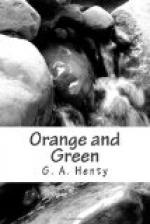Preface.
The subject of Ireland is one which has, for some years, been a very prominent one, and is likely, I fear, for some time yet to occupy a large share of public attention. The discontent, manifested in the troubles of recent years, has had its root in an old sense of grievance, for which there was, unhappily, only too abundant reason. The great proportion of the soil of Ireland was taken from the original owners, and handed over to Cromwell’s followers, and for years the land that still remained in the hands of Irishmen was subject to the covetousness of a party of greedy intriguers, who had sufficient influence to sway the proceedings of government. The result was the rising of Ireland, nominally in defence of the rights of King James, but really as an effort of despair on the part of those who deemed their religion, their property, and even their lives threatened, by the absolute ascendency of the Protestant party in the government of the country. I have taken my information from a variety of sources; but, as I wished you to see the matter from the Irish point of view, I have drawn most largely from the history of those events by Mr. O’Driscol, published sixty years ago. There is, however, but little difference of opinion between Irish and English authors, as to the general course of the war, or as to the atrocious conduct of William’s army of foreign mercenaries towards the people of Ireland.
G. A. Henty.
Chapter 1: A Shipwreck.
A few miles to the south of Bray Head, on the crest of a hill falling sharply down to the sea, stood Castle Davenant, a conspicuous landmark to mariners skirting the coast on their way from Cork or Waterford to Dublin Bay. Castle Davenant it was called, although it had long since ceased to be defensible; but when it was built by Sir Godfrey Davenant, who came over with Strongbow, it was a place of strength. Strongbow’s followers did well for themselves. They had reckoned on hard fighting, but the Irish were too much divided among themselves to oppose any serious resistance to the invaders. Strongbow had married the daughter of Dermid, Prince of Leinster, and at the death of that prince succeeded him, and the greater portion of Leinster was soon divided among the knights and men-at-arms who had followed his standard. Godfrey Davenant, who was a favourite of the earl, had no reason to be dissatisfied with his share, which consisted of a domain including many square miles of fertile land, stretching back from the seacoast.
Here for many generations his descendants lived, for the most part taking an active share in the wars and disturbances which, with scarcely an interval of rest, agitated the country.
The castle had continued to deserve its name until forty years before the time this story commences, when Cromwell’s gunners had battered a breach in it, and left it a heap of smoking ruins. Walter Davenant had died, fighting to the last, in his own hall. At that time, the greater part of his estate was bestowed upon officers and soldiers in Cromwell’s army, among whom no less than four million acres of Irish land were divided.




